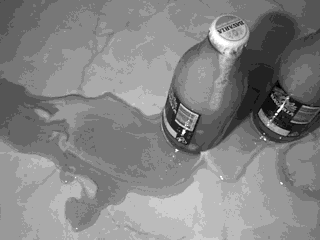Last night some guests left a couple of beers in the freezer. They forgot about them in the fog from the other beer they drank, and I discovered them this afternoon when I went to put another beer in the freezer. The bottles were frozen solid, but they hadn't exploded. The pressure from the expanding liquid had loosened the caps, and each bottle was blessed with a little halo of frozen beer slush. I was pleasantly surprised they hadn't exploded as the beers of my youth did. I suppose that means that either the little bottles of Dutch beer have a greater structural integrity and/or more alcohol. (I suspect the former, as the beer in question was rather lame at only three percent alcohol.)
The science became really interesting when I put the frozen bottles on a warm counter. The bottles started whining and whooshing, then they dribbled a steady stream of beer down the side. A person with an elementary grasp of physics would no doubt have understood why beer expands when it freezes as well as when it warms, but as a blissfully ignorant artist I just admired the mystery of my little icy volcanoes.
Subsequent inquiries revealed that the liquid wasn't really beer, but the essence of beer. It was like beer syrup; it tasted like beer-flavored vodka. (No I'm not going to reveal whether or not I licked it off the counter: the artistic process must retain some aura of mystery.)
I wonder if I can repeat the above process and go hiking with little vials of beer purée? The possibility adds a new dimension to the old beer vs. whiskey backpacking debates. On the domestic front, though, the moral of this story is clear: beer belongs in refrigerators; freezers are for film and vodka.
